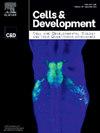Blastoid:实验室中人类发展的未来。
IF 2
4区 生物学
Q4 Biochemistry, Genetics and Molecular Biology
引用次数: 0
摘要
人类早期发育研究对于了解生命起源和疾病发病机制至关重要。然而,由于伦理限制和技术局限,这些研究面临着巨大挑战。干细胞技术的进步促使人们开发出blastoids来克服这些挑战"。囊胚是由多能干细胞(PSC)产生的三维结构,类似于人类胚胎的囊胚阶段。对胚泡的研究可以增进我们对人类早期发育的了解,推动再生医学和疾病建模的创新。本综述概述了类囊体发育的背景,并强调了现有类器官研究的局限性。综述介绍了类囊体研究的发展,从以前使用动物模型进行的研究,到现在在人类早期发育研究中使用人类干细胞衍生类囊体的最新进展。此外,本综述还对各种研究中开发类囊体的方法进行了比较分析,评估了类囊体作为再生医学、人类发育生物学和胚胎研究的伦理替代品的潜力。它进一步评估了围绕类囊体研究的伦理和社会考虑因素、解决这些问题的当前策略以及对科学和医学的潜在长期影响。我们的目标是全面了解类囊体研究的当前趋势,为人类早期发育提供新的见解,并为研究人员提出新的方向和方法。本文章由计算机程序翻译,如有差异,请以英文原文为准。
Blastoid: The future of human development in the laboratory
Research on early human development is crucial for understanding the origins of life and mechanisms underlying disease onset. However, these studies have significant challenges owing to ethical restrictions and technical limitations. Stem cell technology advancement has led to the development of blastoids to overcome these challenges.” Blastoids are three-dimensional structures produced by pluripotent stem cells (PSCs) that resemble the blastocyst stage of human embryos. Research on blastoids can enhance our understanding of early human development and drive innovations in regenerative medicine and disease modeling.
This review outlines the background of blastoid development and highlights the limitations of existing organoid research. It presents developments in blastoid research, from previous studies using animal models to the latest developments using human stem cell-derived blastoids in early human development studies. Additionally, this review provides a comparative analysis of the methods used to develop blastoids across various studies, evaluating their potential as ethical alternatives for regenerative medicine, human developmental biology, and embryonic research. It further assesses the ethical and social considerations surrounding blastoid research, the current strategies to address these concerns, and the potential long-term impact on science and medicine.
We aimed to provide a comprehensive understanding of the current trends in blastoid research, offer new insights into early human development, and suggest novel directions and approaches for researchers.
求助全文
通过发布文献求助,成功后即可免费获取论文全文。
去求助
来源期刊

Cells and Development
Biochemistry, Genetics and Molecular Biology-Developmental Biology
CiteScore
2.90
自引率
0.00%
发文量
33
审稿时长
41 days
 求助内容:
求助内容: 应助结果提醒方式:
应助结果提醒方式:


